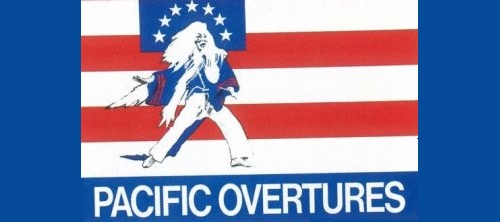
A musical with book by John Weidman, Pacific Overtures traces the history of Japan from the first contact with America (via Commodore Matthew Perry) through the modern age. The "development" of the country is represented by two characters, Kayama Yasaemon, a traditional samurai, and his friend Manjiro, a fisherman who had been shipwrecked in Boston, where he embraced Western ways. As Japan becomes more Westernized, Kayama embraces the new culture while Manjiro rejects it, rediscovering his roots. All this is acted out against a backdrop of the greater changes in Japan, as the Japanese and the world powers all try to capitalize on the opening up of Japan.
Act I
Conceived as a sort of Japanese playwright's version of an American musical about American influences on Japan, Pacific Overtures begins its journey to the present day in July 1853. Since the foreigners were driven from the island empire, explains the Reciter, there has been nothing to threaten the changeless cycle of their days. Elsewhere, wars are fought and machines are rumbling but in Nippon they plant rice, exchange bows and enjoy peace and serenity.
But President Millard Fillmore, determined to open up trade with Japan, has sent Commodore Matthew C. Perry across the Pacific, and, to the consternation of Lord Abe and the Shogun's other Councillors, the stirrings of trouble begin with the appearance of Manjiro, a fisherman who was lost at sea and rescued by Americans. He returns to Japan and attempts to warn Abe of the presence of warships in the waters around Okinawa, but is instead arrested for consorting with foreigners. A minor samurai, Kayama is appointed Prefect of the Police at Uraga to drive the Americans away - news which leaves Tamate, his wife, grief-stricken since it will result in certain failure and shame. As he leaves, she expresses her feelings in dance as two Observers describe the scene and reveal her thoughts in "There Is No Other Way". As a Fisherman, a Thief and other locals relate the sight of the "Four Black Dragons" roaring through the sea, an extravagant Oriental caricature of the USS Powhatan pulls into harbor. Kayama is sent to meet with the Americans but he is rejected as not important enough. He enlists the aid of Manjiro, the only man in Japan who has dealt with Americans, and disguised as a great lord, Manjiro gets an answer from them: Commodore Perry announces that he must meet the Shogun within six days or else he will shell the city. Faced with this ultimatum the Shogun takes to his bed. Exasperated by his indecision, his Mother with elaborate courtesy, poisons him with "Chrysanthemum Tea."
With the Shogun dead, Kayama devises a plan by which the Americans, thanks to a covering of tatami mats and a raised Treaty House, can be received without having, technically, to set foot on Japanese soil. He and Manjiro set off for Uraga, forging a band of friendship through the exchange of "Poems". Kayama has saved Japan, but it is too late to save Tamate. He returns home to find her dead from seppuku. Already events are moving beyond the control of the old order: the two men pass a Madam instructing her inexperienced Girls in the art of seduction as they prepare to "Welcome to Kanagawa" the foreign devils.
Commodore Perry and his men come ashore and, on their "March to the Treaty House", demonstrate their goodwill by offering such gifts as two bags of Irish potatoes and a copy of Owen's "Geology of Minnesota". The negotiations themselves are seen through the memory of three who were there: a warrior who could hear the debates but not see it from his hiding place in the floor of the house, a young boy who could see the action but not hear it from his perch in the tree outside, and the boy as an old man recalling that without "Someone In a Tree", a silent watcher, history may have been incomplete. Initially, it seems as if Kayama has won: the Americans depart in peace. But then the barbarian figure of Commodore Perry leaps out to perform a traditional Kabuki "Lion Dance", which ends as a strutting, triumphalist, all-American cakewalk.
Act II
The child emperor (portrayed by a puppet manipulated by his advisors) reacts with pleasure to the departure of the Americans, promoting Lord Abe to Shogun, Kayama to Governor of Uraga and Manjiro to the rank of Samurai. The crisis appears to have passed, but to the surprise of Lord Abe the Americans return to request formal trading arrangements. To the tune of a Sousa march, they bid Japan "Please Hello" and are followed by a Gilbertian British Admiral, a clog-dancing Dutch Admiral, a gloomy Russian and a dandified Frenchman all vying for access to Japan's markets. With this new western threat, the faction of the Lords of the South grow restless. They send a politically charged gift to the Emperor, a storyteller who tells a vivid, allegorical tale of a brave young emperor who frees himself from his cowardly Shogun.
The years pass as Kayama and Manjiro dress themselves for tea. As Manjiro continues to dress with painstaking slowness into ceremonial robes for the tea ritual, Kayama slowly adopts the manners and dress of the newcomers, proudly displaying his new pocket watch, cutaway coat and "A Bowler Hat". But there are other less pleasant changes prompted by westernization. Three British Sailors mistake a "Pretty Lady" for a geisha. Though their approach is gentle, the girl cries for help and her father kills the confused Tars. Reporting on the situation to the Shogun, Kayama witnesses Lord Abe's murder by cloaked assassins and himself is killed by one of their number - his former friend, Manjiro.
In the ensuing turmoil the puppet Emperor seizes real power and vows that Japan will modernize itself. As the country moves from one innovation to the "Next!", the Imperial robes are removed layer by layer to show the Reciter in T-shirt and black trousers. Contemporary Japan - the world of Toyota and Seiko, air pollution and contaminated beaches -assembles itself around him. "There was a time when foreigners were not welcome here. But that was long ago," he says. "Welcome to Japan."
The title of the work is drawn directly from text in a letter from Admiral Perry addressed to the Emperor dated July 7, 1853: "Many of the large ships-of-war destined to visit Japan have not yet arrived in these seas, though they are hourly expected; and the undersigned, as an evidence of his friendly intentions, has brought but four of the smaller ones, designing, should it become necessary, to return to Edo in the ensuing spring with a much larger force. But it is expected that the government of your imperial majesty will render such return unnecessary, by acceding at once to the very reasonable and pacific overtures contained in the President's letter, and which will be further explained by the undersigned on the first fitting occasion."
Pacific Overtures opened on Broadway at the Winter Garden Theatre on January 11, 1976, and closed after 193 performances on June 27, 1976. Directed by Harold Prince, the choreography was by Patricia Birch, scenic design by Boris Aronson, costume design by Florence Klotz, and lighting design by Tharon Musser. The original cast recording was released originally by RCA Records and later on CD. This production was nominated for 10 Tony Awards, and won Best Scenic Design (Boris Aronson) and Best Costume Design (Florence Klotz).
An off-Broadway production ran at the Promenade Theatre from October 25, 1984 for 109 performances, transferring from an earlier production at the York Theatre Company. Directed by Fran Soeder with choreography by Janet Watson, the cast featured Ernest Abuba and Kevin Gray.
The European premiere was directed by Howard Lloyd-Lewis (Library Theatre, Manchester) at Wythenshawe Forum in 1986 with choreography by Paul Kerryson who subsequently directed productions in 1993 and 2006 at Leicester Haymarket Theatre.
A major production of the show was mounted in London by the English National Opera in 1987. The production was recorded in its entirety, preserving nearly the entire libretto as well as the score.
A critically acclaimed 2001 Chicago Shakespeare Theater production, directed by Gary Griffin,[5] transferred to the West End Donmar Warehouse, where it ran from June 30, 2003 until September 6, 2003 and received the 2003 Olivier Award for Best Musical Production.
In 2002 the New National Theatre of Tokyo presented two limited engagements of their production, which was performed in Japanese with English supertitles. The production ran at Avery Fisher Hall, Lincoln Center from July 9, 2002 through July 13, and then at the Eisenhower Theater, Kennedy Center, from September 3, 2002 through September 8.
A Broadway revival ran at Studio 54 from December 2, 2004 to January 30, 2005, directed by Amon Miyamoto and starring B.D. Wong as the Narrator and several members of the original cast. A new Broadway recording, with new (reduced) orchestrations by orchestrator Jonathan Tunick was released by PS Classics, with additional material not included on the original cast album.[4] The production was nominated for four Tony Awards, including Best Revival of a Musical.
The Original broadway production was filmed and broadcast on Japanese television in 1976.
Act One
Prologue — Orchestra
The Advantages of Floating in the Middle of the Sea — Reciter and Company
There Is No Other Way — Tamate, Observers
Four Black Dragons — Fisherman, Thief, Reciter, Townspeople
Chrysanthemum Tea — Shogun, Shogun's Mother, Shogun's Wife, Soothsayer, Priests, Shogun's Companion, Physician, Sumo Wrestlers
Poems — Kayama, Manjiro
Welcome to Kanagawa — Madam and Girls
March to the Treaty House — Orchestra
Someone in a Tree — Old Man, Reciter, Boy, Warrior
Lion Dance — Commodore Perry
Act Two
Please Hello — Abe, Reciter, American, British, Dutch, Russian and French Admirals)
A Bowler Hat — Kayama
Pretty Lady — Three British Sailors
Next — Reciter and Company
Mako — Reciter, Shogun, Jonathan Goble
Soon-Teck Oh — Tamate, Kayama's Wife, Samurai, Storyteller, Swordsman
Isao Sato — Kayama
Yuki Shimoda — Abe, First Councillor
Sab Shimono — Manjiro
Ernest Abuba — Samurai, Adams, Noble
James Dybas — Second Councillor, Old Man, French Admiral
Timm Fujii — Son, Priest, Girl, Noble, British Sailor
Haruki Fujimoto — Servant, Commodore Matthew Calbraith Perry
Larry Hama — Williams, Lord of the South
Ernest Harada — Physician, Madam, British Admiral
Alvin Ing — Shogun's Mother, Observer, Merchant, American Admiral,
Patrick Kinser-Lau — Shogun's Companion, Girl, Dutch Admiral, British Sailor
Jae Woo Lee — Fisherman, Sumo Wrestler, Lord of the South
Freddy Mao — Third Councillor, Samurai's Daughter
Tom Matsusaka — Imperial Priest
Freda Foh Shen — Shogun's Wife
Mark Hsu Syers — Samurai, Thief, Soothsayer, Warrior, Russian Admiral, British Sailor
Ricardo Tobia — Observer
Gedde Watanabe — Priest, Girl, The Boy
Conrad Yama — Grandmother, Sumo Wrestler, Japanese Merchant
Fusako Yoshida — Musician, Shamisen
Proscenium Servants, Sailors and Townspeople: Kenneth S. Eiland, Timm Fujili, Joey Ginza, Patrick Kinser-Lau, Diane Lam, Tony Marinyo, Kevin Maung, Kim Miyori, Dingo Secretario, Freda Foh Shen, Mark Hsu Seyers, Gedde Watanabe, Leslie Watanabe, Ricardo Tobia
Aucun dossier informatif complémentaire concernant Pacific Overtures
Aucun dossier informatif complémentaire concernant Pacific Overtures

Version 1
Pacific Overtures (1975-11-Shubert Theatre-Boston)
Type de série: Pre-Broadway Try OutThéâtre: Shubert Theatre (Boston - Etats-Unis) Durée : 3 semaines Nombre : Première Preview : 08 November 1975
Première: 08 November 1975
Dernière: 29 November 1975Mise en scène : Harold Prince • Chorégraphie : Patricia Birch • Producteur : Star(s) :

Version 2
Pacific Overtures (1975-12-Kennedy Center for the Performing Arts-Washington)
Type de série: Pre-Broadway Try OutThéâtre: Kennedy Center for the Performing Arts (Washington - Etats-Unis) Durée : 3 semaines Nombre : Première Preview : 04 December 1975
Première: 04 December 1975
Dernière: 27 December 1975Mise en scène : Harold Prince • Chorégraphie : Patricia Birch • Producteur : Star(s) :
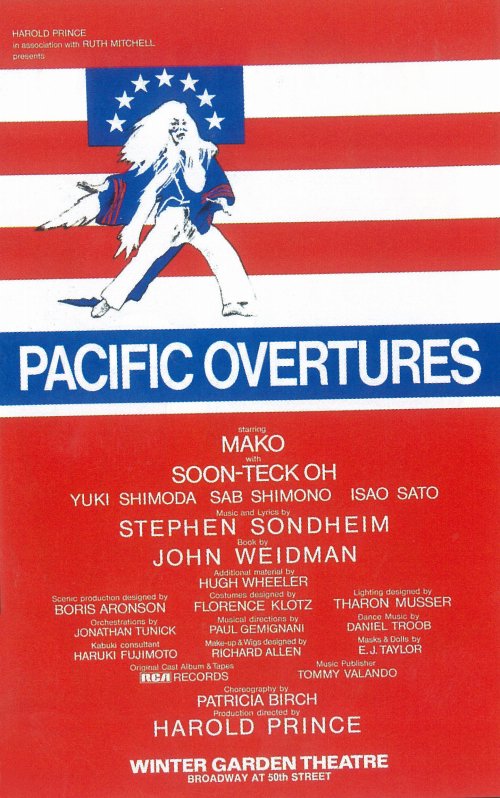
Version 3
Pacific Overtures (1976-01-Winter Garden Theatre-Broadway)
Type de série: OriginalThéâtre: Winter Garden Theatre (Londres - Angleterre) Durée : 5 mois 2 semaines Nombre : 13 previews - 193 représentationsPremière Preview : 31 December 1975
Première: 11 January 1976
Dernière: 27 June 1976Mise en scène : Harold Prince • Chorégraphie : Patricia Birch • Producteur : Star(s) : Avec: Reciter - Mako / Abe, First Councillor - Yuki Shimoda / Manjiro - Sab Shimono / Second Councillor - James Dybas / Shogun's Mother - Alvin Ing / Third Councillor - Freddy Mao / Kayama - Isao Sato / Tamate, Samurai, Storyteller, Swordsman - Soon-Teck Oh / Samurai - Ernest Abuba, Mark Hsu Syers / Servant - Haruki Fujimoto / Observers - Alvin Ing, Ricardo Tobia / Fisherman - Jae Woo Lee / Merchant - Alvin Ing / Son - Timm Fujii / Grandmother - Conrad Yama / Thief - Mark Hsu Syers / Adams - Ernest Abuba / Williams - Larry Hama / Commodore Perry - Haruki Fujimoto / Shogun's Wife - Freda Foh Shen / Physician - Ernest Harada / Priests - Timm Fujii, Gedde Watanabe / Soothsayer - Mark Hsu Syers / Sumo Wrestlers - Conrad Yama, Jae Woo Lee / Shogun's Companion - Patrick Kinser-Lau / Shogun - Mako / Madam - Ernest Harada / Girls - Timm Fujii, Patrick Kinser-Lau, Gedde Watanabe, Leslie Watanabe / Old Man - James Dybas / Boy - Gedde Watanabe / Warrior - Mark Hsu Syers / Imperial Priest - Tom Matsusaka / Nobles - Ernest Abuba, Timm Fujii / American Admiral - Alvin Ing / British Admiral - Ernest Harada/ Dutch Admiral - Patrick Kinser-Lau / Russian Admiral - Mark Hsu Syers / French Admiral - James Dybas / Lords of the South - Larry Hama, Jae Woo Lee / Jonathan Goble - Mako / Japanese Merchant - Conrad Yama / Samurai's Daughter - Freddy Mao / British Sailors - Timm Fujii, Patrick Kinser-Lau, Mark Hsu Syers / Proscenium Servants, Sailors, and Townspeople - Susan Kikuchi, Diane Lam, Kim Miyori, Freda Foh Shen, Kenneth S. Eiland, Timm Fujii, Joey Ginza, Patrick Kinser-Lau, Tony Marinyo, Kevin Maung, Dingo Secretario, Mark Hsu Syers, Ricardo Tobia, Gedde Watanabe, and Leslie Watanabe
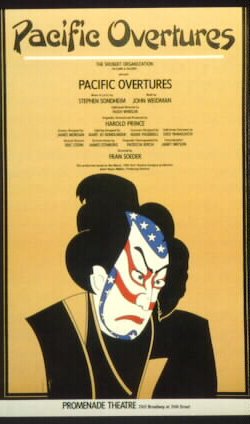
Version 4
Pacific Overtures (1984-10-Promenade Theatre-Off Broadway)
Type de série: RevivalThéâtre: Promenade Theatre (Broadway (Off) - Etats-Unis) Durée : 3 mois Nombre : 109 représentationsPremière Preview : 25 October 1984
Première: 25 October 1984
Dernière: 27 January 1984Mise en scène : Fran Soeder • Chorégraphie : Janet Watson • Producteur : Star(s) : Avec: Ernest Abuba (Reciter), John Bantay (Commodore Perry), John Baray (Old Man / American Admiral), Chuck Brown (Shogun's Mother / British Admiral), John Caleb (John / Manjiro / Fisherman / French Admiral), Ray Contreras (Warrior / British Sailor), Tim Ewing (Thief), Timm Fujii (Tamate / British Sailor), Kevin Gray (Kayama Yesaemon), Gerri Igarashi (Proscenium Servant), Thomas Ikeda (Madam / Russian Admiral), Francis Jue (Boy / Dutch Admiral / British Sailor), Gayln Kong (Proscenium Servant), Diane Lam (Proscenium Servant), Tony Marino (Lord Abe), Tom Matsusaka (Imperial Priest), Christine Toy (Proscenium Servant), Allan Tung (Fencing Master's Daughter), Ronald Yamamoto (Merchant)
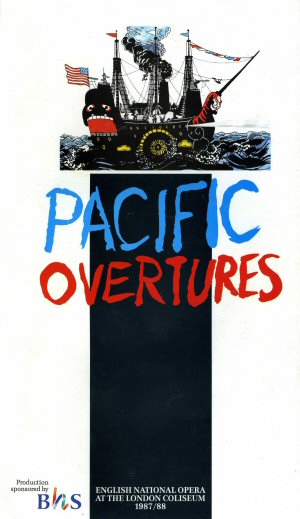
Version 5
Pacific Overtures (1987-09-Coliseum Theatre-London)
Type de série: Original LondonThéâtre: Coliseum Theatre (Londres - Angleterre) Durée : 2 mois 2 semaines Nombre : 27 représentationsPremière Preview : 10 September 1987
Première: 10 September 1987
Dernière: 26 November 1987Mise en scène : Keith Warner • Chorégraphie : David Toguri • Producteur : Star(s) : Avec: Richard Angas (Reciter), Malcolm Rivers (Kayama), Christopher Booth-Jones (Manjiro), John Kitchiner (Lord Abe), Graham Fletcher (Commodore Perry), Michael Sadler (Tamate), Simon Masterton-Smith (The Shogun’s Mother), Terry Jenkins (Madam)Commentaires : This revolutionary work had a musical score which started with the haunting and mournful sounds of shamisen, shakuhachi and Japanese tonal ranges and gradually, as the country became more Westernised, so did the music - until the final scene is one of frantic heavy rock. It was a history of Japan written from the viewpoint of the Japanese and performed in the style of Kabuki Theatre, with “invisible” stage hands, all the women’s roles played by men, and a “reciter” who comments on the action, reciting the occasional haiku. The critics split exactly in half: it was the most astonishing, original, exciting, profound and brilliant musical; it was a pretty but incomprehensible bore.
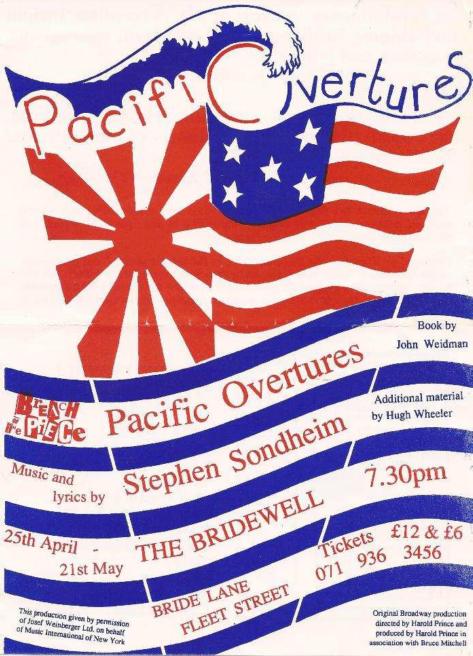
Version 6
Pacific Overtures (1994-04-Bridewell Theatre-London)
Type de série: RevivalThéâtre: Bridewell Theatre (Londres - Angleterre) Durée : 3 semaines Nombre : Première Preview : 25 April 1994
Première: 25 April 1994
Dernière: 21 May 1994Mise en scène : Carol Metcalfe • Chorégraphie : Producteur : Star(s) : Avec: Roland Beame, Francis Crampsie, Lyanna Iveson, Thomas Monk, Rosalind Moore, Clive Paget, Tim Sawers, Victoria Simmonds, Marton York.Commentaires : This was the second production by the resident company at the newly opened Bridewell Theatre—a converted Victoria swimming bath and laundry, just off Fleet Street. There were acoustic and spatial problems with the new venue, and the peculiar effect of the orchestra being hidden in what used to be the swimming pool and the conductor occasionally popping his head above stage for the benefit of the singers. The production chose to use a mixed cast (the original had used an all-male cast in the Japanese Kabuki traditions). It was felt
that what had been big and unwieldy on the Coliseum stage at its premiere now gained a great deal from its more intimate setting and performance space, but generally the performance and production was felt to be a bit lacklustre and unexciting.
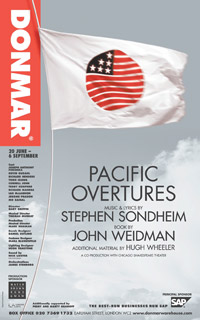
Version 7
Pacific Overtures (2003-06Donmar Warehouse-London)
Type de série: RevivalThéâtre: Donmar Warehouse (Londres - Angleterre) Durée : 2 mois 1 semaine Nombre : Première Preview : 20 June 2003
Première: 30 June 2003
Dernière: 06 September 2003Mise en scène : Gary Griffin • Chorégraphie : Producteur : Star(s) : Avec: Joseph Anthony Foronda (Reciter / Shogun / Emperor), Kevin Gudhal (Kcryama), Togo Igawa, Teddy Kempner, Ian McLarnon, Jerome Pradon, Richard Henders, Mo Zainal, Rocjard Manera, Cornell JohnCommentaires : With a cast of just ten performers and four musicians in a mixed American and English company, this show had originated at the Chicago Shakespeare Theater. Once again it split the critics (and the audiences) into two opposing camps:
(1) This sparse, cut-down production gave the work a clarity, strength and intellectual brilliance that had been missing from the “overblown” English National Opera premiere in 1987, and marked it as one of Sondheim’s most fascinating and rewarding works of art.
(2) This production clearly reveals the show to be culturally awkward, with condescending Western attitudes offering half-baked imitations of Kabuki which come over as pier-end panto. By a slight majority, the critics hailed this as a major triumph, but there was still a significant number strongly against the show.Presse : CHARLES SPENCER for THE DAILY TELEGRAPH says, "..facetious bore....lacks pace and pep."
PAUL TAYLOR for THE INDEPENDENT says, "It's a musical of ideas more than of character and, at times, the proceedings can feel a little desiccated."
BENEDICT NIGHTINGALE for THE TIMES says, "It still left me unmoved and exasperated."
MICHAEL BILLINGTON for THE GUARDIAN says, "this is still a great musical that satirises America's historical determination to impose its values on other civilisations." He goes on to say, "This musical ripples with felt emotion."
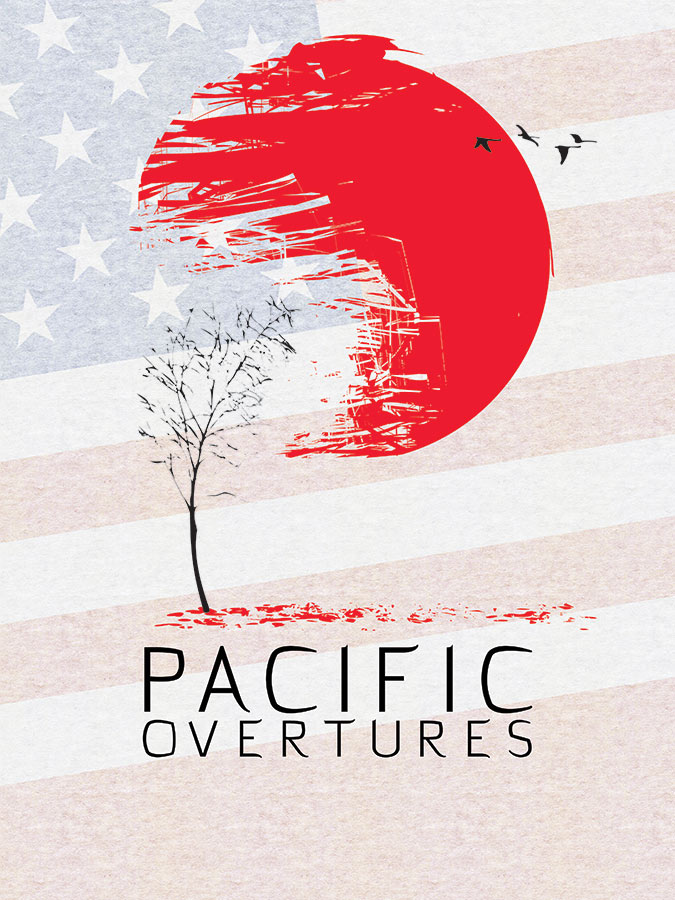
Version 8
Pacific Overtures (2014-07-Union Theatre-London)
Type de série: RevivalThéâtre: Union Theatre (Londres - Angleterre) Durée : 4 semaines Nombre : Première Preview : 02 July 2014
Première: 04 July 2014
Dernière: 02 August 2014Mise en scène : Michael Strassen • Chorégraphie : Producteur : Star(s) : Avec: Ken Christiansen (Reciter), Oli Reynolds (Kayama), Emanuel Alba (Manjiro/Dutch Admiral), Alex Mcmorran (Lord Abe), Marc Lee Joseph (Shogun's Mother/French Admiral), Ian Mowat (Madam/Old Man/British Admiral), Joel Harper-Jackson (Geisha/American Admiral/Sailor), Lee Van-Geleen (Thief/Russian Admiral/Sailor), Matt Jolly (Fisherman/Geisha/Young Boy), Anthony Selywn (Tamate), Marios Nicolaides (Commodore Perry), Joel Baylis (Priest/Geisha/Sailor), and Josh Andrews (Priest/Geisha).Commentaires : Additional material by Hugh Wheeler and Original Orchestrations by Jonathan Tunick
Musical Direction by Richard Bates.
Pas encore de video disponible pour ce spectacle